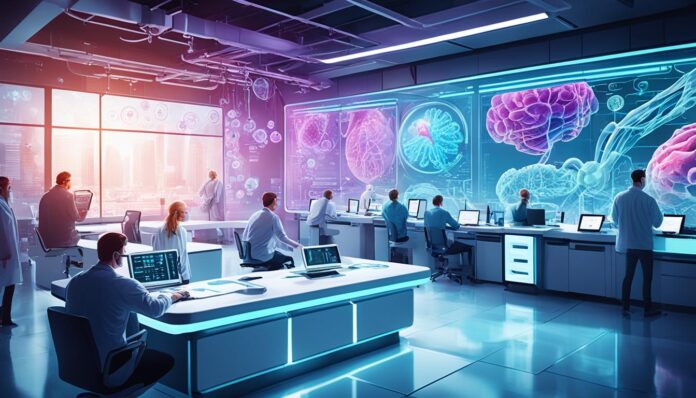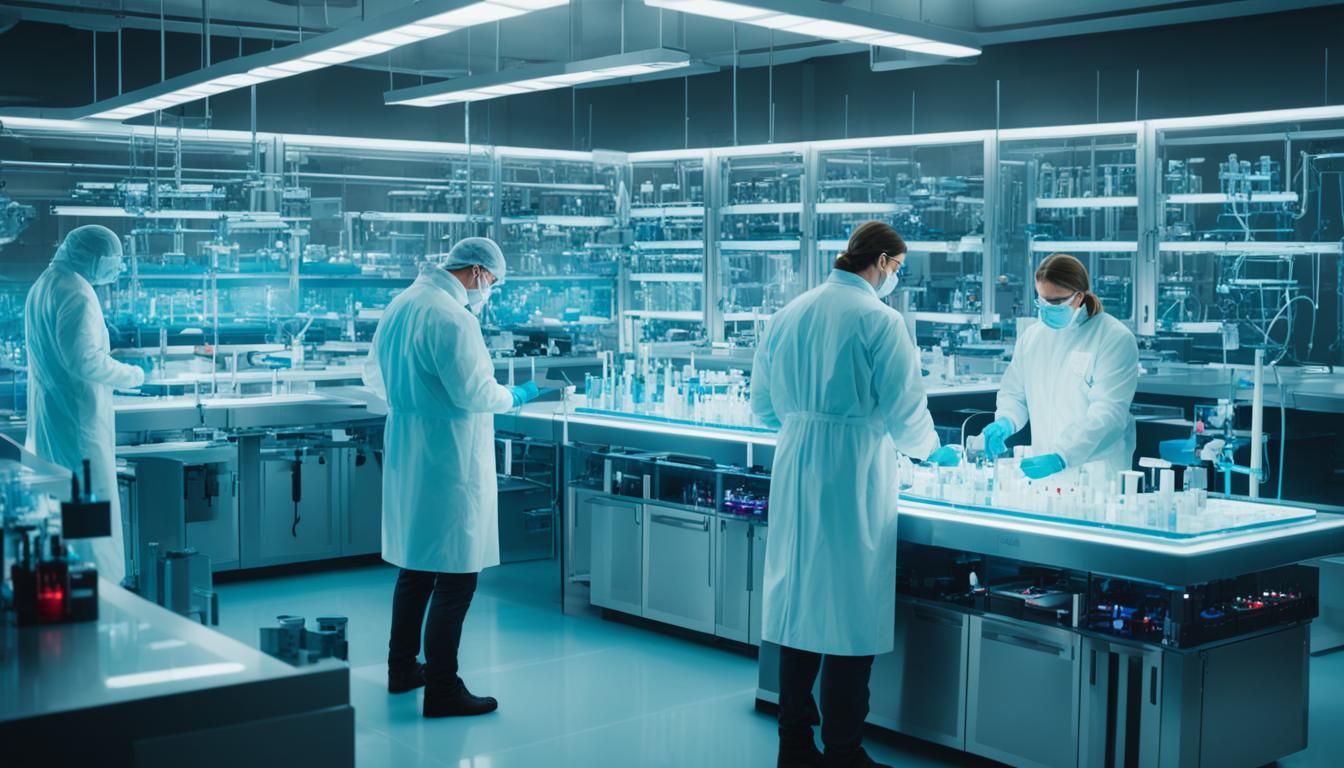
Synthetic biology is an emerging field of science and engineering that uses synthetic processes to design, alter, and create biological components, ranging from proteins to entire organisms. Two major scientific breakthroughs have made synthetic biology possible: CRISPR-Cas9 and PCR. CRISPR-Cas9 allows biologists to remove and replace a portion of the gene sequence, while PCR enables the copying of DNA many times for easier study. Together, these techniques have opened up numerous possibilities for medical applications of synthetic biology, including the development of synthetic gene circuits, engineered probiotics, therapeutic metabolites, personalized medicine, biomanufacturing of pharmaceuticals, disease modeling, and biocomputing.
Key Takeaways
- Synthetic biology is revolutionizing the medical industry with a wide range of potential applications by 2025.
- CRISPR-Cas9 and PCR are two major scientific breakthroughs that have enabled the development of synthetic biology.
- Synthetic biology offers possibilities for creating synthetic gene circuits, engineered probiotics, therapeutic metabolites, personalized medicine, biomanufacturing of pharmaceuticals, disease modeling, and biocomputing.
- Synthetic biology has the potential to improve treatments, create testing environments, and reduce infection risk in the medical field.
- The adoption and implementation of synthetic biology solutions are heavily influenced by regulatory frameworks and ethical considerations.
Revolutionizing Therapeutics: Synthetic Biology’s Impact on Medical Treatments
Synthetic biology has three primary purposes in medicine: improving treatments, creating testing environments, and reducing infection risk. Vaccines often use live viruses that have been weakened, and synthetic biology allows scientists to weaken viruses at the genomic level, leading to safer and more effective vaccines. Synthetic biology also plays a key role in drug development, as scientists can create cell cultures that can mimic human body parts without requiring a human donor. Additionally, synthetic biology can make vectors of disease less dangerous by altering viral and bacterial DNA to reduce the ability to infect.
Engineering Safer and More Effective Vaccines
Synthetic biology techniques enable scientists to engineer probiotics and other therapeutic metabolites that can strengthen the immune system and provide targeted protection against various diseases. By precisely modifying the genetic code of pathogens, researchers can create vaccine candidates that are less virulent but still trigger a robust immune response, leading to safer and more effective vaccines.
Accelerating Drug Development and Personalized Medicine
Synthetic biology is transforming drug development by enabling the creation of cell cultures that can mimic human body parts without requiring human donors. This allows scientists to test drugs and study disease processes in a controlled environment, accelerating the drug development process. Furthermore, synthetic biology techniques can be used to develop personalized medicine, where treatments are tailored to an individual’s genetic makeup, leading to more effective and targeted therapies.
Combating Antimicrobial Resistance with Synthetic Antibiotics
Researchers have developed a synthetic antibiotic, named cilagicin, that can potentially work against drug-resistant bacteria. Cilagicin was discovered using a computational approach, where algorithms were used to predict the structure of antibiotic-like compounds that could be produced by uncharacterized bacterial gene clusters. This synthetic compound was found to be effective against Gram-positive bacteria, including drug-resistant strains, and successfully treated bacterial infections in mice. The study demonstrates a scalable method for discovering and developing new antibiotics, which is crucial in the face of the growing threat of antimicrobial resistance.
What are the potential applications of synthetic biology in medicine by 2025?
Designer Cells for Disease Treatment and Drug Delivery
Scientists at Imperial College London have developed a method to engineer artificial cells that mimic the dynamic features of natural biological cells, including the ability to change their internal organization in response to environmental cues. This advancement in synthetic biology could have significant implications for treating disease and illness, as well as for targeted drug delivery. The engineered artificial cells can be designed to disperse or change their internal structure in response to specific chemical or mechanical triggers, allowing for more controlled and precise delivery of therapeutic agents.
Biomanufacturing of Pharmaceuticals
Synthetic biology is also transforming the way pharmaceuticals are manufactured. Synthetic biology techniques can be used to create biomaterials and metabolic byproducts from engineered microorganisms, which can then be used in place of traditional, often petroleum-derived, materials. This not only reduces the environmental impact of pharmaceutical production but also opens up new possibilities for creating specialized, tailored compounds for medical use.

Ethical and Regulatory Considerations
As the field of synthetic biology continues to advance, navigating the complex regulatory landscape and addressing ethical concerns are paramount. Collaborating with regulatory experts and adhering to established guidelines is essential for ensuring the responsible deployment of these innovative technologies.
Navigating Regulatory Frameworks
The adoption and implementation of synthetic biology solutions, particularly in medical and environmental applications, are heavily influenced by regulatory frameworks. Regulatory compliance is crucial for ensuring the safety and efficacy of synthetic biology-based products and treatments. Staying up-to-date with the latest regulations, collaborating with regulatory bodies, and following best practices are necessary steps for successfully integrating synthetic biology into the medical industry.
Addressing Ethical Concerns
Alongside regulatory compliance, the ethical implications of synthetic biology must also be carefully considered. These powerful technologies have the potential to significantly impact human health, the environment, and society as a whole. Addressing ethical concerns, such as the potential misuse of these technologies, the equitable access to synthetic biology-derived solutions, and the long-term consequences of altering biological systems, is crucial for the responsible development and application of synthetic biology in medicine and beyond.
Conclusion
As the field of synthetic biology continues to evolve, it is clear that its potential applications in the medical industry by 2025 are truly remarkable. From engineering safer and more effective vaccines to accelerating drug development and personalized medicine, this transformative technology is revolutionizing the way we approach healthcare. The development of synthetic antibiotics to combat antimicrobial resistance, the creation of designer cells for targeted disease treatment and drug delivery, and the biomanufacturing of pharmaceuticals are just a few examples of the exciting possibilities that synthetic biology holds.
However, as this field advances, it is essential that we navigate the complex regulatory frameworks and address the ethical concerns that arise. Ensuring the responsible and effective deployment of these powerful technologies is crucial in the pursuit of improved human health and well-being. By collaborating with regulatory experts, adhering to established guidelines, and addressing ethical considerations, we can harness the full potential of synthetic biology to positively impact the lives of individuals and communities across the United States.
The future of medicine is bright, and synthetic biology is leading the charge. By embracing this innovative field and addressing the challenges that come with it, we can unlock a new era of healthcare that is safer, more effective, and tailored to the unique needs of each individual. The possibilities are endless, and the time to act is now.
FAQ
What are the potential applications of synthetic biology in medicine by 2025?
Synthetic biology has the potential to revolutionize the medical industry by 2025 through advancements in areas such as engineering safer and more effective vaccines, accelerating drug development and personalized medicine, combating antimicrobial resistance with synthetic antibiotics, creating designer cells for disease treatment and drug delivery, and biomanufacturing of pharmaceuticals.
How can synthetic biology help engineer safer and more effective vaccines?
Synthetic biology allows scientists to weaken viruses at the genomic level, leading to safer and more effective vaccines. This is a significant improvement over traditional methods that often use live viruses that have been weakened.
What role does synthetic biology play in accelerating drug development and personalized medicine?
Synthetic biology techniques can be used to create cell cultures that mimic human body parts without requiring human donors. This allows scientists to test drugs and study disease processes in a controlled environment, accelerating the drug development process. Furthermore, synthetic biology can enable the development of personalized medicine, where treatments are tailored to an individual’s genetic makeup, leading to more effective and targeted therapies.
How can synthetic biology help combat antimicrobial resistance?
Researchers have developed a synthetic antibiotic, called cilagicin, that can potentially work against drug-resistant bacteria. The study demonstrates a scalable method for discovering and developing new antibiotics, which is crucial in the face of the growing threat of antimicrobial resistance.
What are the potential applications of designer cells in synthetic biology for disease treatment and drug delivery?
Scientists have developed a method to engineer artificial cells that mimic the dynamic features of natural biological cells, including the ability to change their internal organization in response to environmental cues. This advancement in synthetic biology could have significant implications for treating illness and disease, as well as for targeted drug delivery, as the engineered artificial cells can be designed to disperse or change their internal structure in response to specific triggers, allowing for more controlled and precise delivery of therapeutic agents.
How can synthetic biology transform the biomanufacturing of pharmaceuticals?
Synthetic biology techniques can be used to create biomaterials and metabolic byproducts from engineered microorganisms, which can then be used in place of traditional, often petroleum-derived, materials. This not only reduces the environmental impact of pharmaceutical production but also opens up new possibilities for creating specialized, tailored compounds for medical use.
What are the key regulatory and ethical considerations for the adoption of synthetic biology in medicine?
Collaborating with regulatory experts and adhering to established guidelines is essential for navigating the complex regulatory landscape and ensuring the responsible deployment of synthetic biology technologies. Additionally, addressing ethical concerns, such as the potential misuse of these technologies, the equitable access to synthetic biology-derived solutions, and the long-term consequences of altering biological systems, is crucial for the responsible development and application of synthetic biology in medicine and beyond.
